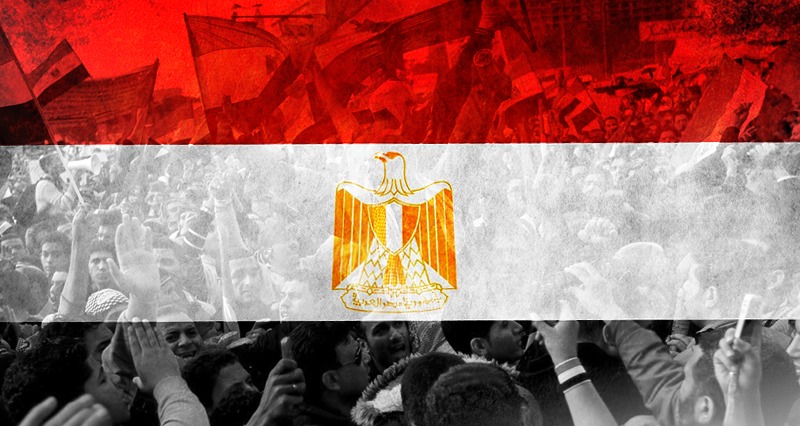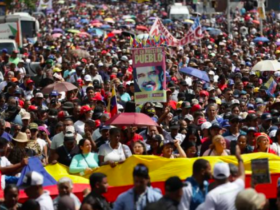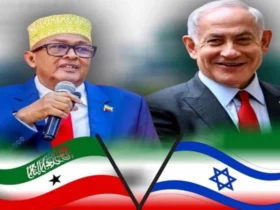Egypt is a country of revolutions and coups. There is a constant dance between revolutionaries and the militias who enact coups after civil forces take power. Today, the people are once again on the verge of defeating Sisi’s coup by making a revolution: the second the country has seen in the span of a short few years.
PROTEST, COUP AND SPRING
The protests which took place in February 2011 in Egypt, now known as the Arab Spring, overthrew Hosni Mubarak, a man who had ruled Egypt for 30 years. Until he was overthrown, Mubarak was considered one of the most powerful rulers in the Arab world.
After his ouster, Mubarak’s defense minister, Mohamed Hussein Tantawi, took control of the country for 16 months, essentially continuing the former leader’s path.
Tantawi was eventually pushed by protesters to hold the 2012 presidential election, where Muslim Brotherhood candidate Mohamed Morsi became the country’s new leader. This election showed that the nature of the protests against Mubarak were Islamic in nature, and that Egyptians were far more in support of Islamic politicians than liberal ones.
Mohamed Morsi’s presidency only lasted 13 months, at which point the Egyptian army took control of the government under command of Abdel Fattah el-Sisi, who appointed Adly Mansour as the temporary president.
After the coup, Sisi resorted to unprecedented violence against the Muslim Brotherhood and arrested Morsi, Mohammed Badie (the leader of the Muslim Brotherhood), Mohamed Beltagy (the Secretary-General of the Freedom and Justice Party) and many other leaders in the group, also killing a large number of Islamists. Finally, he launched a military offensive against Muslim Brotherhood positions in the Sinai desert: an unprecedented move. Naturally, the UAE and Saudi Arabia strongly supported Abdel Fattah el-Sisi’s actions.
In 2014, eleven months after Mansour came to power, Sisi won the presidency with 96% of the vote in an election where he had no serious competitor– it was the beginning of a dark era of civil rights for all Egyptians. In 2018, he re-nominated himself as President of Egypt in a similar election, this time pulling in over 97% of the vote.
However, after seven years of civil and political throbbing in Egypt, the people again took to the streets to oppose the Egyptian dictatorship in September 2019.
The recent protests in Egypt are much smaller than the one that toppled Hosni Mubarak, but Sisi is not about to let them get off the ground. He has met the protests with extreme violence, yet still finds himself confronted with citizens who have the courage to stand up against his policies in the streets of Cairo.
WHO IS MUHAMMAD ALI?
Muhammad Ali is an Egyptian businessman and actor currently living in Spain. He is intelligent and charismatic figure with a large audience of Egyptians on YouTube. The most important problems facing Egyptians today are government corruption and poverty, issues around which Ali has rallied people and encouraged them to protest. He claims that he had worked as a contractor for the Egyptian army for some time, but that the army has still not paid his salary because of government corruption. He also accuses Sisi of excessive spending and luxurious living. Ali has no evidence to prove his claims, but knows just what to say to bring Egyptians into the streets. He speaks like an average person, not like a politician, and appeals to the people’s anger rather than their logic. Meanwhile, Sisi’s and the military’s accusations against him indicate that his claims likely have some truth to them.
DOES TRUMP SUPPORT SISI?
The most important concern the US has in the Middle East is Israel’s security and Washington makes all its positions on this basis. Looked at in terms of that issue, Sisi has been doing very well, keeping Israel safe from a major security threat by repressing the Muslim Brotherhood.
However, the general situation is less than ideal. If we consider the Egyptian military forces to be the source of Sisi’s power, he has weakened himself by dismissing and imprisoning numerous army commanders who have disagreed with him. The repression of people in all sectors of society has led to protests equally as broad– losing the loyalty of the army, however, should sound serious alarm bells for a leader who relies on them to stay in control.
Meanwhile, Washington-Cairo relations are also not perfect, despite their mutual interests. Trump, for instance, refused to designate the Muslim Brotherhood as a terrorist group as Sisi had requested, nor did he agree on the formation of an Arab military coalition.
THE IMPORTANCE OF EGYPT IN THE POLITICAL LANDSCAPE OF THE MIDDLE EAST
The Arab world has seen many changes over the last hundred years, many of which began in Egypt. Egypt has always been at the center of Muslim intellectual life, and has a profound influence on Africa, Europe, the middle east and the Arab world due to its special geopolitical position.
On the one hand, Egypt has always been an inspiring country for its African neighbors, especially Algeria, Tunisia and Libya. On the other hand, it has often been dependent financially on Saudi Arabia and more recently on the UAE. Its reliance on the US for security has forced the country to maintain a good relationship with Israel.
Egypt plays a crucial role in maintaining security in the Suez Canal, Gaza and the Sinai desert. Egypt’s policies always threaten to have a direct impact on Israel as the largest US security and trade partner in the Middle East.
EGYPT’S RELATIONS WITH TEHRAN AND ANKARA
Egypt’s foreign policy can be divided into two historical moments before and after the 2011 revolution.
Before the 2011 revolution, Egyptians had confined their policy to the Arab world. Therefore, Iran and Turkey were excluded from their foreign policy because their entry into Egyptian geopolitics would diminish Cairo’s role in the Arab world.
After the 2011 revolution, however, there was a major shift in Egyptians foreign policy and the country expanded its geopolitical map to include the entire Middle East including Iran, Turkey and even Pakistan.
The anti-Iranian view that was the product of Hosni Mubarak’s rule was shed when Morsi came to power as was the negative view between Turkey which had been prevalent since the collapse of the Ottoman Empire. While, there are many differences between the Turkish Muslim Brotherhood and the Egyptian Muslim Brotherhood, Morsi’s rule promised to bring these two countries together.
When Sisi took control of the country the situation changed dramatically once again and Saudi Arabia had a new ally to help them prevent Iran and Turkey from penetrating further into the Middle East. The Egyptian army has a long history of supporting the Salafists in order to prevent the spread of the Muslim Brotherhood, an issue that goes back to Muhammad Anwar Sadat.
Sisi has essentially transformed Egypt from a powerful independent country into a Saudi-colonized puppet doing the kingdom’s bidding against Iran and Turkey.
WHITHER EGYPT?
Sisi’s policies in recent years have destroyed not only the Muslim Brotherhood but all civil life in Egypt. He does not even know the difference between people’s protests for their livelihoods and protests against the government as such, and thus he reacts brutally in repressing both. This is contrary to the nature of the Egyptian people who have learned to achieve their goals through civic behavior over the last decade.
















Leave a Reply